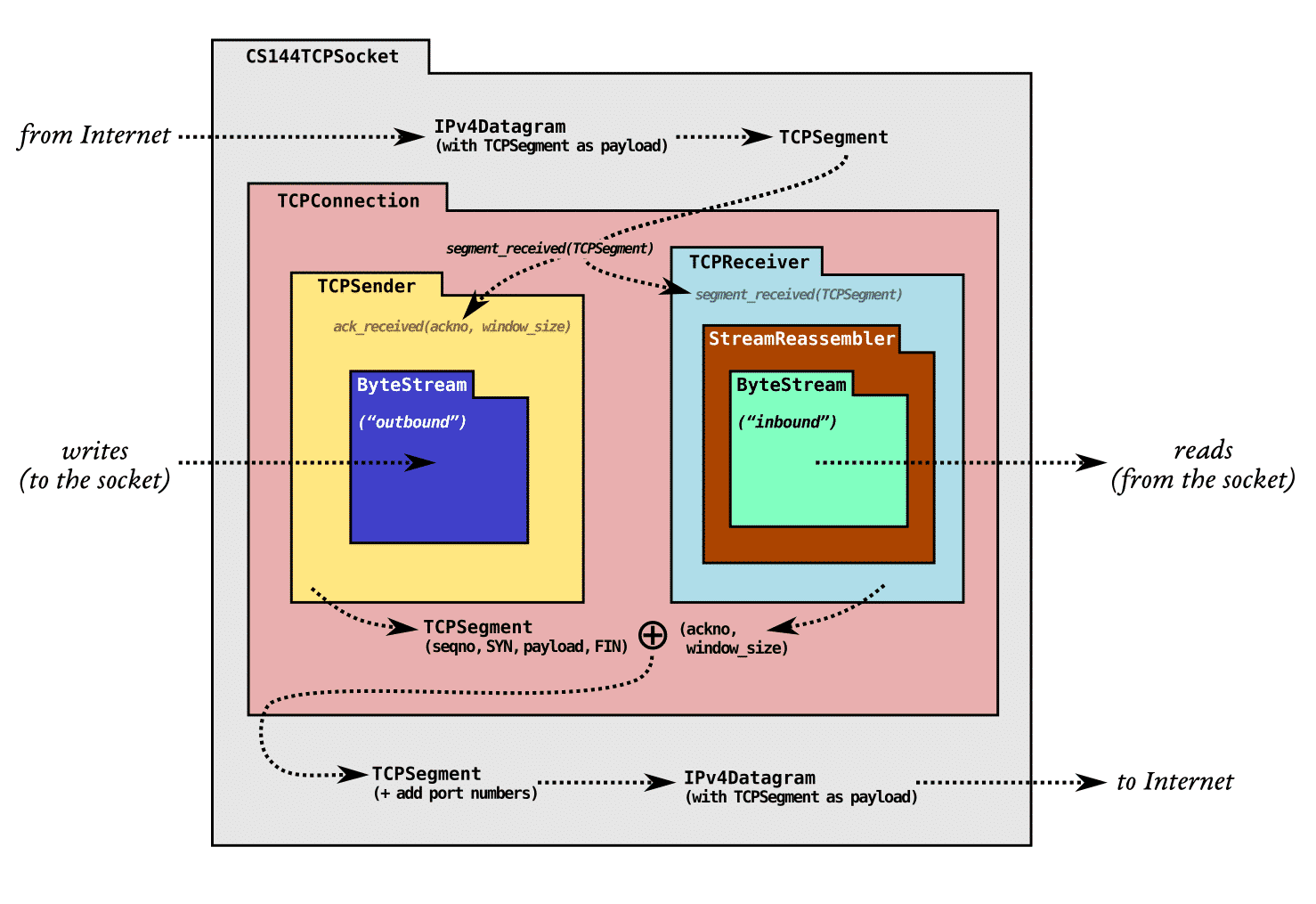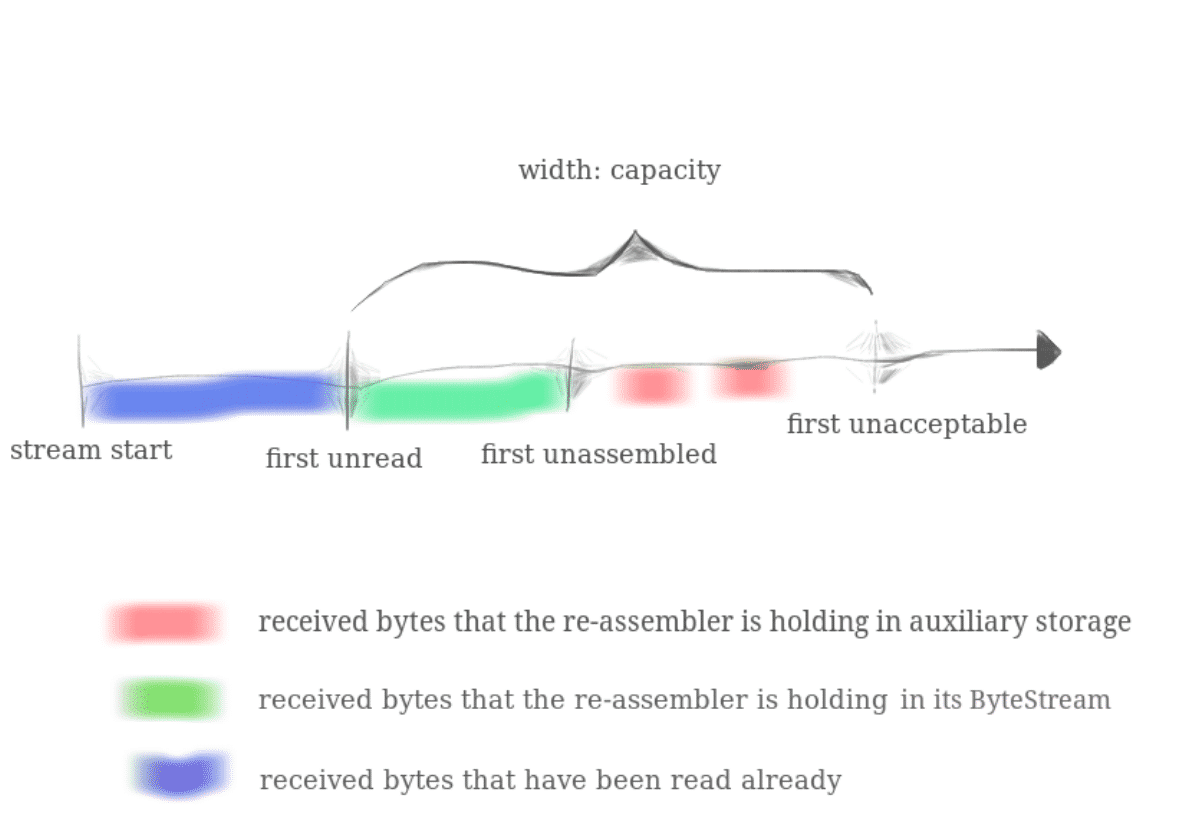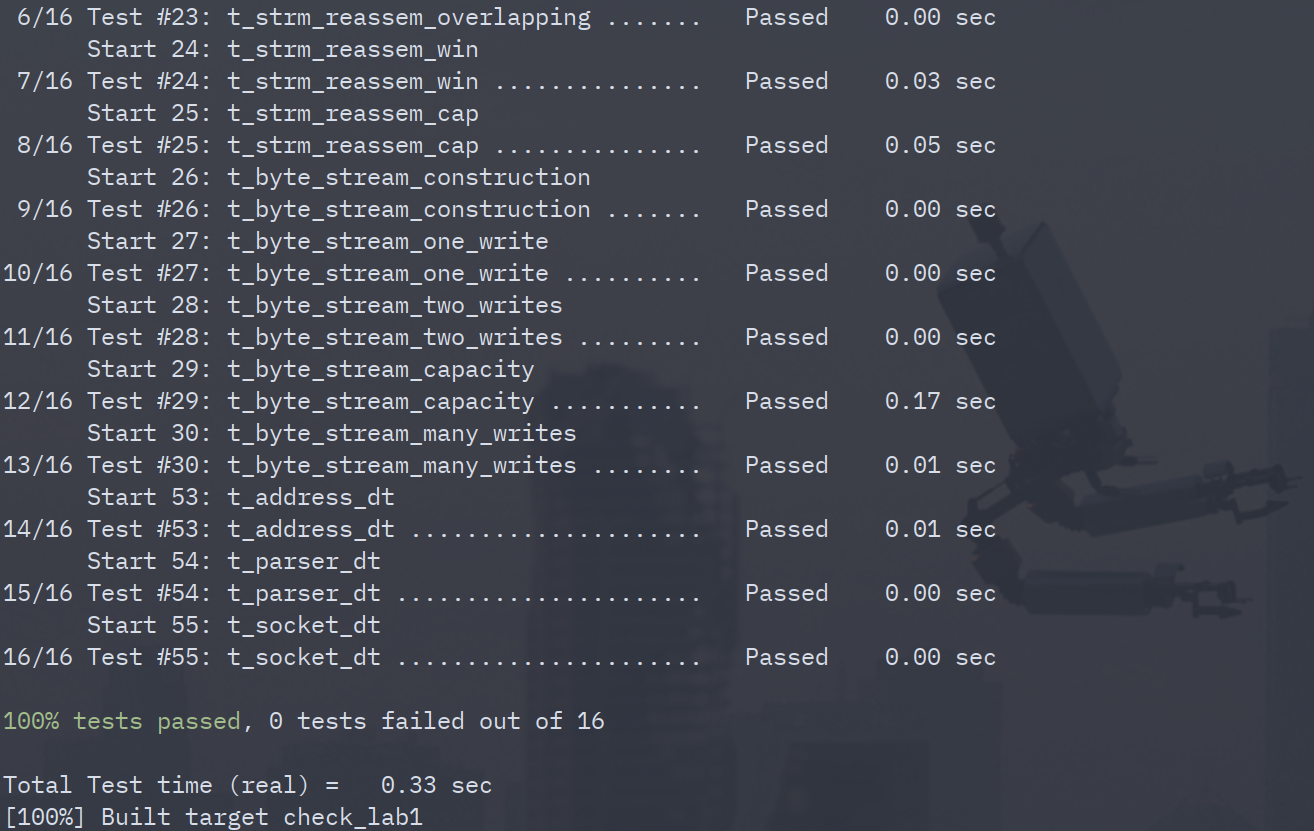[TOC]
先放一张经典的图… Do you see the lab1 work ?
我们需要去实现一个流重载器,因为在进行数据的接收时都是无序的,需要进行重新的组合得到一个有序的数据。
The keypoint is the capacity. 这也是TCP实现限流的一个重要的手段
capacity 意味着从被读入到没有被组合的位置的长度不能大于capcaity,所以我们需要去定义额外的数据结果去保存我们的未被组装的数据。
实现思想是使用map去记录未被编码进入的数据,保存 index和string 和数据
每次加入一个新的数据时,先使用二分查找去在未被编码的数据中查找合适的数据集合,对这些有重合/可连接的数据进行操作
连接,直接前面相连或者后面相连
重合,将重合的部分去掉,合并为一个未被编码的数据
随后尝试将第一个数据加入到ouput中
小于等于_next,将合理数据加入进去
大于_next, 直接返回
然后判断结束情况
有eof标识,设置结束index
如果结束index已经设置,判断是否已经完全加入,直接结束ouput
1 2 3 4 5 6 7 8 9 10 class StreamReassembler { private : ByteStream _output; size_t _capacity; std::map<size_t , std::string>_unassembled_bytes; size_t unassembled_bytes_num; size_t _next_index; size_t _eof_index;
1 2 3 4 5 6 7 8 9 10 11 12 13 14 15 16 17 18 19 20 21 22 23 24 25 26 27 28 29 30 31 32 33 34 35 36 37 38 39 40 41 42 43 44 45 46 47 48 49 50 51 52 53 54 55 56 57 58 59 60 61 62 63 64 65 66 67 68 69 70 71 72 73 74 75 76 77 78 79 80 81 82 83 84 85 86 87 88 89 90 91 92 93 94 95 96 97 98 void StreamReassembler::push_substring (const string &data, const size_t index, const bool eof) size_t start = index; size_t end = index + data.length () - 1 ; string new_data = data; auto start_iter = _unassembled_bytes.lower_bound (start); if (data.empty ()) goto assemble_from; if (end < _next_index) return ; if (start_iter != _unassembled_bytes.begin ()) start_iter--; if (!_unassembled_bytes.empty ()&& start_iter->first <= start && start_iter->first + start_iter->second.length () -1 >= end) goto assemble_from; for (auto i = start_iter; i != _unassembled_bytes.end ();) { size_t now_start = i->first; size_t now_end = i->first + i->second.length () - 1 ; if (now_start < start && now_end >= start - 1 ) { size_t len = start - now_start; new_data = i->second.substr (0 , len) + new_data; start = now_start; unassembled_bytes_num -= i->second.length (); i = _unassembled_bytes.erase (i); } else if (now_start >= start&& now_end <= end) { unassembled_bytes_num -= i->second.length (); i = _unassembled_bytes.erase (i); } else if (now_start > end + 1 ) break ; else if (now_start <= end + 1 && now_end > end) { size_t len = now_end - end; try { new_data += i->second.substr (i->second.length () - len, len); } catch (std::exception &e) { printf ("errrr %s" ,e.what ()); } unassembled_bytes_num -= i->second.length (); i = _unassembled_bytes.erase (i); } else if (now_end < start - 1 ) i++; else { break ; } } _unassembled_bytes.insert (make_pair (start, new_data)); unassembled_bytes_num += new_data.length (); assemble_from: if (!_unassembled_bytes.empty ()) { auto i = _unassembled_bytes.begin (); size_t remaining_capacity = _output.remaining_capacity (); if (i->first <= _next_index) { size_t now_start = i->first; string now_data = i->second; size_t all_has = _next_index - now_start; try { now_data = now_data.substr (all_has, now_data.length () - all_has); } catch (std::exception &e) { printf ("errrr %s" ,e.what ()); } size_t can_input = min (now_data.length (), remaining_capacity); _next_index += can_input; string read_data = now_data.substr (0 , can_input); string un_data; try { un_data = now_data.substr (can_input, now_data.length () - can_input); } catch (std::exception &e) { printf ("errrr %s" ,e.what ()); } _output.write (read_data); unassembled_bytes_num -= read_data.length (); _unassembled_bytes.erase (i); if (!un_data.empty ()) _unassembled_bytes.insert (make_pair (_next_index, un_data)); } } if (eof) { _eof_index = index + data.size (); } if (_eof_index <= _next_index) _output.end_input (); } size_t StreamReassembler::unassembled_bytes () const return unassembled_bytes_num; }bool StreamReassembler::empty () const return _unassembled_bytes.empty (); }
最终测试结果基本在0.33s左右,自信)









